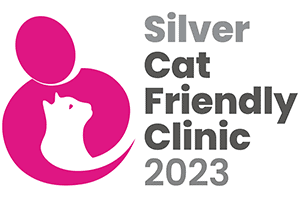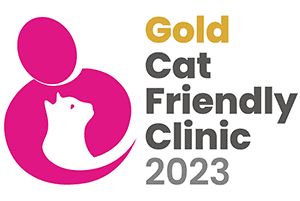Puppies and kittens often have endless amounts of energy and enthusiasm, this is a great way to view the world, and we should encourage this optimism to help create confident cats and dogs.
Harnessing this energy into appropriate exercise regimes will also result in happier, healthier pets.
How much exercise does my puppy or kitten need?
Puppies
As standard, Huntingdon vets, Cromwell vets, recommend, in line with the official Kennel Club recommendations, five minutes of exercise per month of age; this can be carried out twice a day.
e.g. eight weeks of age > 10 minutes twice a day
four months of age > 20 minutes twice a day
What is the secret to a tired and fulfilled puppy?
Mental stimulation – this is just as important as physical exercise. It’s recommended to provide physical exercise, mental stimulation, and ‘down’ time so that puppies can rest and learn to focus through exciting events.
What exactly is mental stimulation?
Mental stimulation is exercise for the brain; it helps with:
- Boredom prevention– if the brain isn’t exercised, puppies and dogs will find other sources of mental stimulation such as chewing, digging or barking
- Improves owner to dog bond – mental stimulation games and play can increase owner to dog relationships making happier dogs and owners
- Improves overall behaviour – increasing mental stimulation helps reduce stress or frustration in dogs and helps promote good behaviour choices
- Helps dogs tackle frustration – dogs can often get frustrated (the toy that rolls under the sofa or the kibble that isn’t in reach). Using appropriate mental stimulation games can help dogs become less frustrated and to build their levels of concentration.
Puppies are like children in how they react to tasks they deem ‘challenging’. Mental stimulation for puppies will drain their energy levels quickly compared to adult dogs. Some puppies will become frustrated quicker with certain tasks than other puppies.
St Ives vets say that assessing this during mental stimulation is essential. It is a good relationship builder if you can support puppies through tasks they may find difficult and reward them for attempting, even if they are not successful.
Mental stimulation games to play:
- Find the food – this can be as simple as hiding puppy food or treats around the house and asking your puppy to find them or scattering puppy biscuits in the grass outside
- Food dispensing toys – such as slow feeders or puzzle feeders. These can slow a puppy or adult dog from eating too quickly; this increases mental stimulation as they must work for their food
- Learning new tasks – learning new ‘party tricks’ can be fun to demonstrate to other people, but how about teaching puppies behaviours you would prefer to see? Cromwell vets in Cambourne recommend teaching ‘settle’ or simply rewarding for when your puppy isn’t doing anything at all; this will enable your puppy over time to understand that ‘calmness’ is a behaviour worth doing as they will be rewarded for this. Teaching recall is another task that can provide mental stimulation through learning.
Top Tip – dogs learn by association and must be rewarded within one second for them to associate the reward.
Dogs love to sniff, and we often don’t give dogs enough time to carry out this important task. Letting a dog off their lead helps them feel satisfied from sniffing everything from grass to other dogs! Puppies are often unsure in new spaces, so having them off their lead early ensures they learn to stay close from a young age.
St Neots vets confirm that training your dog as early as possible to be off their lead is recommended. It should be done in a safe, enclosed area, preferably not at home, as the puppy will know their own surroundings and act differently in an unfamiliar area. Read our tips on training to walk your dog with a lead here.
Please note that short bursts of mental stimulation games are advised, especially for puppies.
Click here to read further information on dog training and puppy care with DogsTrust.
Kittens
With cats and kittens, there is no set amount of exercise that should be carried out, but at least two play sessions per day for 15-20 minutes should help reduce boredom and keep them active.
The preferred methods of play for cats are:
- Pouncing – toys that can be pounced on are a good choice
- Climbing – cats naturally prefer to be high up; having safe areas for cats to climb on, such as scratching posts, is another good option
- Chasing – similar to dogs, cats like to chase. Long feather type toys are a good choice
- Batting – cats also like to push things around the floor; rolling toys such as balls are good for this
- Exploring – new areas or objects such as cardboard boxes or cat activity stands.
Cats tend to hunt and be most active at dawn and dusk, which is a good time to play. You can also encourage play and satisfaction by dropping a few cat treats when your kitten or cat has successfully ‘caught’ a toy. Trying different types of toys is also beneficial as this will help you discover what’s best for your kitten. Some prefer slow movements of toys whilst others like fast darting toys to chase.
Did you know that cats have a predatory sequence?
Search, stalk, chase, pounce, catch and manipulate. So, we must mimic the ‘catch’ part of this when playing with our kittens.
I have a house cat; do I need to do anything differently?
Indoor cats may be more at risk of experiencing boredom and frustration. The average distance a cat would cover outdoors is around 40-200 meters, so it’s important to factor this when planning exercise and activities for indoor cats to ensure they are stimulated.
Examples of enrichment for cats include:
- Cardboard boxes – use different sizes and move these around in different locations every day
- Cat activity stands or scratching posts – the taller the scratching post, the better – ceiling height is preferred, but generally twice the size of a cat, when stood on their back legs, is a good size
- Puzzle feeders
- Various toys – use different toys every day and then re-use previous toys the following week
- Shelves – placing shelves around the house will make for one very happy cat as they prefer to explore from above; a cat outdoors spends most of their time above the ground.
If you have any questions relating to puppy or kitten exercise, please get in touch with our team, and we will be happy to assist you in answering any questions you may have.




